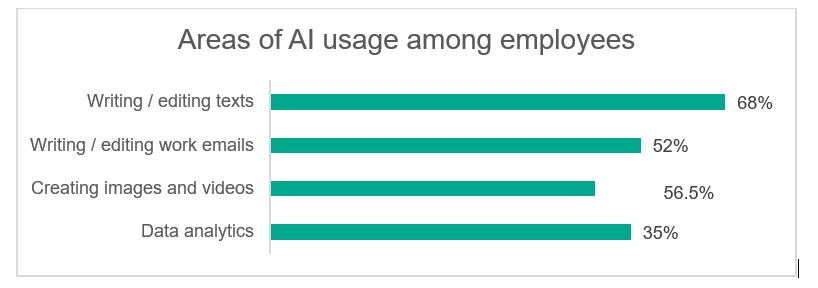• Only 52% of those who use artificial intelligence (AI) tools have received training on their safe and responsible use.
• 68% of employees use AI for writing or editing tasks.
• 52% of employees use AI to write emails.
• 56.5% of employees use AI to create images or videos, while 35% use it for data analysis.
• 81% of employees say that generative AI tools are allowed in their organizations.
• 15% of employees report that generative AI tools are not permitted in their workplace.
A new report from Kaspersky reveals that 86% of professionals in Pakistan now use AI tools for work. These tools support tasks like writing, editing, email drafting, image creation, and data analysis.
AI Tools Become Essential in Pakistani Workplaces
Although 98% of respondents understand the term “generative artificial intelligence,” only 52% have received cybersecurity training. This gap exposes organizations to risks such as data leaks and prompt injection attacks.
Generative AI Tools Drive Daily Tasks
The report shows that 81% of workplaces allow generative AI tools. However, 15% prohibit them, and 4% of employees remain unsure. Many use AI without formal guidance, contributing to the rise of shadow IT.
AI Awareness Is High, But Security Training Is Lacking
Among trained employees, 66% learned how to use AI effectively and create prompts. Only 52% received instruction on cybersecurity. Alarmingly, 21% of professionals said they received no training at all.
Kaspersky Urges AI Governance and Policy Reform
Kaspersky urges companies to adopt clear policies that regulate AI use based on data sensitivity. These policies should define approved tools and restrict usage in high-risk areas.
Rashed Al Momani, General Manager for the Middle East at Kaspersky, stated, “Complete bans and unrestricted use rarely work. A balanced policy supported by training ensures flexibility and security.”
Secure AI Tool Use Starts With Employee Education
Kaspersky recommends specialized training for responsible AI use. Its Automated Security Awareness Platform offers courses on AI safety. The “Large Language Models Security” module helps IT teams defend against exploitation.
The company also advises installing cybersecurity solutions on all devices used for work. Kaspersky Next products protect against phishing and fake AI tools.
Conclusion: Policy, Training, and Protection
As AI becomes a daily tool, companies must balance innovation with security. Clear policies, proper training, and strong protection can help employees use AI safely and effectively.
For more Tech-related news, visit: https://greenpost.com.pk/category/technologyandinnovation/
Also, stay updated with verified reports, impactful headlines, and real-time coverage. We bring you trusted news from across Pakistan and beyond. For full stories, in-depth analysis, and exclusive updates, follow or visit. The Public Purview







